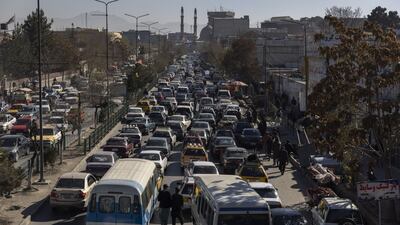The Taliban’s minister of education has said secondary schoolgirls can attend exams this week in 31 of the country’s 34 provinces, an announcement branded farcical by female pupils who say they have been unable to attend classes.
The directive was announced in two documents obtained by the Associated Press, which were signed by Ehsanullah Kitab, head of the Kabul education department.
Millions of girls across the country have been banned from attending school for more than a year now, leading to widespread international condemnation and an outcry among Afghan pupils who fear for their own future. The Taliban allow most primary schoolgirls to attend classes, although restrictions for female pupils remain and vary from province to province.
It had been hoped that the hardliners, who took control of the country in August last year, would resume classes for girls, after representatives appeared to soften their long-held opposition to female education.
But in March — after a six-month hiatus due to the fallout from the transition to full Taliban rule — the group said schooling would resume for girls only under the right conditions.
Some analysts say the movement is divided as to how to proceed and the Taliban’s deputy foreign minister, Sher Mohammad Abbas Stanikzai, has said he is in favour of female education. But no decision has yet been made to reopen schools, although some schooling has been allowed by local Taliban authorities, in some districts.
Isobel Coleman, deputy director of the US Agency for International Development, said the decision was “shameful”.
“443 days & counting since the Taliban banned girls’ secondary school education. This must change. Education is a human right,” she said on Twitter.
Western donors spent billions of dollars on education in Afghanistan during the course of the 20-year conflict, which followed a US-led invasion of the country to oust the Taliban and install a democratic government.
That period of the war — Afghanistan has seen near incessant violence since the Soviet Union invaded in 1979 — ended in August last year when the Taliban regained control of Kabul.
At the end of the effort to boost education in the country, the percentage of girls in the school-age population went from nearly zero in 2001, when the international coalition toppled the movement, to nearly 50 per cent. About 20,000 schools had been built in the country by 2020.
“This is ridiculous,” said 18-year-old Najela from Kabul, giving only her first name for fear of reprisals. She would now be in 12th grade and eligible for the exam. “We spent a whole year under tension and stress and haven’t read a single page of our textbooks.
“How can we possibly take an exam after a year and a half that the Taliban have kept school doors closed?"
Women have not been denied access to universities under the Taliban. The implication of the latest development is that Afghan girls who obtain a high school diploma after Wednesday's exam would be able to apply for universities — but have only one day to take exams in 14 subjects, with 10 questions in each. The head teacher, who spoke on condition of anonymity, also for fear of reprisals, said most girl pupils lacked textbooks.
"Giving an exam is meaningless,” she said.
The pupils and their female teachers will all have to wear the hijab under the Taliban dress code for women, and mobile phones are banned during the exam.
Girls who cannot attend or who fail Wednesday's exam would be allowed to retake the test in mid-March, after the winter holiday.
The Taliban's treatment of women and girls in Afghanistan has come under heavy criticism. This month, a team of UN experts said it may amount to a crime against humanity and should be investigated and prosecuted under international law, an allegation rejected by the group.

